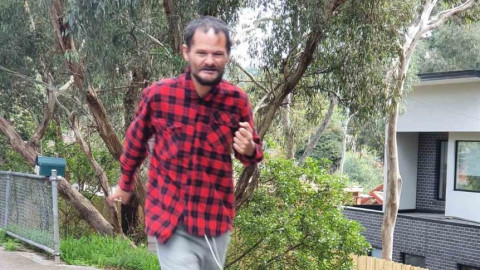
Nas Campanella and Celina Edmonds
Severely autistic man Hayden McLean was kept in a "large caged area" and had an "absolutely horrific" experience adjusting to life in a group home, according to evidence his mother has given at the disability royal commission.
Key points:
- The disability royal commission hears evidence about the prescription of psychotropic medication
- Mother Dariane McLean said her son was prescribed psychotropic drugs to control his behaviour
- Hayden McLean would regularly escape and walk up to 100 kilometres on his own
Victorian woman Dariane McLean gave emotional testimony about her son's 13-year ordeal in supported accommodation and his experience on psychotropic medication.
Mr McLean, now 42 years old, lives with an intellectual disability and as a result of his time in group homes has been diagnosed with post-traumatic stress disorder (PTSD).
The inquiry is examining the use of chemical restraint to control the emotions and behaviour of people with disability.

Hayden McLean would often walk barefoot.(Supplied: Dariane McLean)
Mrs McLean said her son was prescribed psychotropic drugs to control his behaviour on more than one occasion by a locum doctor at the request of the organisation running the home.
"On at least a couple of occasions, we were not informed of that until after it had happened," she said.
Mrs McLean said her son moved into his first group home in 1998 with the aim of giving him more independence.
The inquiry heard the home's doors and windows were locked, TV and stereos were behind locked screens and the backyard was a concrete courtyard with high fences.
"He was not given an opportunity to choose where he lived or who he lived with," Mrs McLean said.
"We were advised that to help him adjust … [we should not] have contact for a month."
Mr McLean's reaction was to destroy his bedroom and regularly escape.
Between 1998 and 2004, he fled the group home more than 170 times and was reported as a missing person to police.
Do you know more about this story? Email Specialist.Team@abc.net.au
Mrs McLean is now a disability advocate and trained counsellor.
She told the commission her son's fellow residents in the group home engaged in "predatory" and "aggressive" behaviour.
"He used an incredible amount of intellect and pragmatic thinking to be able to escape that environment because it was very highly locked and he got out," Mrs McLean said.
Counselling and legal support
- Blue Knot Foundation runs the National Counselling and Referral Service supporting the disability royal commission. It also helps people with disability affected by trauma. Contact them on 1800 421 468
- Your Story Disability Legal Support provides free information and advice to people about sharing their story with the disability royal commission. Call 1800 77 1800
When he did escape, Mr McLean would often walk 100 kilometres while barefoot.
Mr McLean was moved to other group homes where he continued to escape. He was then placed in another locked facility.
"The workers were told not to let him out in the backyard because he would climb over the fence," Mrs McLean said.
"Their response was to jail him really and contain him within the house.
"Goodness knows what he's endured. He's not able to tell us that."
In 2011, Mrs McLean moved her son into rental accommodation, where he could live in the community assisted by support workers.
Initially, it was difficult to get round-the-clock care due to a lack of funding, but that was resolved.
Mr McLean has become an artist, selling many of his pieces online, working through his trauma by drawing and knitting.
He now has two support workers during the day and one overnight.
"The advent of the NDIS has been life-changing, hugely life-changing for my son and many other individuals I support," Mrs McLean said.
"It's definitely not perfect at the moment, but it just doesn't come close to what we had to deal with previously."
Along with his artistic endeavours, Mr McLean still likes to walk long distances, but now when he does so he is accompanied by his two support workers.